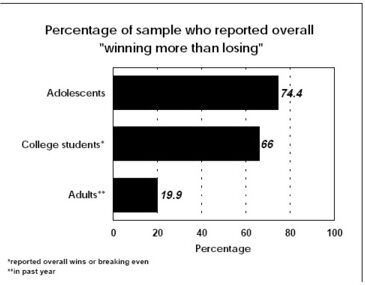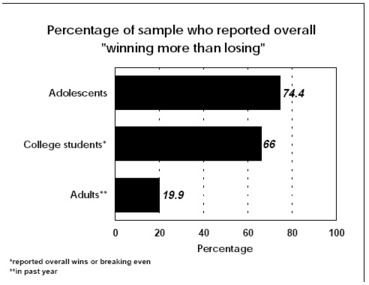In gambling, as in life, people tend to remember positive, exciting events more readily than negative events. A growing literature has begun to examine how accurately gamblers recall their wins and losses. Vagge’s study of 466 6th to 12th grade students found that 60.9% of those who remembered their first gambling experience reported that they won the first time they gambled; 74.4% of the gamblers in this study believed that, overall, they have won more than they have lost [1]. Similarly, Frank surveyed 636 college students over a 3-year period about their gambling activity. Of these 636 students, 66% reported that, overall, they were winning or breaking even [2]. Emerson & colleagues conducted a study among 1028 adults. Of this sample, 68.6% reported that they lost more than they won during the previous year, while 19.9% reported that they won more [3]. Gambling is an activity which, for the majority of participants, results in losses over the long term: organized gambling activities are designed to consistently favor “the house”. Therefore, there is probably some distortion of memory occurring among the college and adolescent samples described above. This distortion, or “memory bias”, may be one explanation for the persistence of gambling activity despite consistent losses [2]. Clinicians working with problem gamblers can use specific strategies, such as cognitive-behavioral therapy, to address a client’s memory bias as part of compulsive gambling treatment. While the adolescent and college samples exhibited some distortion of memory, it appears that the adult sample more accurately recalled their gambling history.
One hypothesis to explain this phenomenon is that age and experience may be a factor in memory bias regarding gambling wins and losses.
Sources:
- Vagge, L. (1996). The development of youth gambling. Unpublished Honors Thesis, Harvard-Radcliffe Colleges, Cambridge, MA.
- Frank, M.L. (1990). Underage gambling in Atlantic City casinos. Psychological Reports, 67, 907-912.
- Emerson, M.O., Laundergan, J.C., & Schaefer, J.M. (1994). Adult survey of Minnesota problem gambling behavior; a needs assessment: Changes 1990 to 1994 (Report to the Minnesota Department of Human Services, Mental Health Division). Duluth: University of Minnesota Center for Addiction Studies.
This public education project is funded, in part, by The Andrews Foundation.





